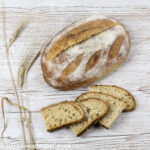Description
These slow fermented light wheat olive oil loaves are infused with a hint of rosemary and utilize an overnight levain to ferment the dough.
Ingredients
Units
Scale
Levain
- 75 grams all-purpose flour
- 50 grams whole wheat flour
- 25 grams sourdough starter (100% hydration)
- 83 grams water
Final Dough
- 200 grams levain (all of above)
- 500 – 625 grams water (depending on coarseness of whole grain used)
- 60 grams extra virgin olive oil
- 800 grams all-purpose flour
- 200 grams whole grain flour (white winter wheat, KAMUT, spelt, etc.)
- 2–3 Tbsp. finely chopped fresh rosemary (or to taste), optional
- 28 grams fine sea salt + 25-40 grams water (as needed)
Instructions
Levain:
- In a medium bowl, whisk together the flours. Make a well in the center. Pour in the starter and mix with the water to break it up.
- Work the starter/water mixture into the flour just until no dry bits of flour remain.
- Cover, and let rest 6-8 hours in warm room temperature. If the ambient temperature in your kitchen is cooler, you may need to let it rest longer, 10-16 hours.
- At this point, the levain may be used in the final dough or placed in the refrigerator for up to 3 days.
Final Dough:
- Pour 500 grams of water and the olive oil in the bowl with the levain. Let rest while you are prepping the other ingredients. Mix to dissolve levain.
- In a large bowl, whisk together the flours and rosemary, if using. Add the levain mixture to the dry ingredients and mix thoroughly. Let rest 20-30 minutes.
- Sprinkle the salt over the dough and dissolve with 15-25 grams of water. If the dough begins to tear, add more water as needed while incorporating the salt into the dough.
- Cover and let rest in a warm place for 2-3 hours. Stretch and fold the dough after 30 minutes and again after 1 hour for a total of 2 stretch and folds. Let rest for remaining 1-2 hours.
- Turn the dough back out onto a floured work surface and deflate the dough. Divide into 3 equal pieces (650-665 grams each) for medium loaves. Total weight of dough should be between 1950-2000 grams, depending on flour used and how much water you incorporate.
- Gather up the edges and preshape the dough into a ball. Flip the ball and place it seam side down on the work surface. Push the dough against the work surface in a circular motion to tighten the top. Pull the dough toward you to elongate the dough into an oval (batard) or round (boule) shape.
- Place in rice flour-dusted and lined oval or round banneton baskets. Let proof for 2-3 hours, longer if the ambient temperature in your kitchen is cooler.
- After the final proof on the counter, the loaves can be baked immediately or placed in the refrigerator overnight for a cold ferment.
- Preheat oven to 450 degrees F. with a baking stone on the middle rack and a steam pan on the lowest shelf. I use a small cast iron skillet as my steam pan.
- Once the oven is sufficiently preheated, gently flip the loaves onto parchment paper. Brush off the excess rice flour, if desired, and dust with all-purpose flour to achieve a nice contrast when baked.
- Score the loaves in the pattern of your choice, then slide the parchment with the loaves onto the preheated baking stone. Immediately add 1 cup of ice cubes to the preheated steam pan and shut the oven door.
- Bake for 30-35 minutes. Check after 15-20 minutes and rotate the loaves for even baking. Then continue baking until nicely browned. The loaves should sound hollow when thumped on the bottom.
- Transfer loaves to a cooling rack and cool before serving.
- Category: Sourdough
